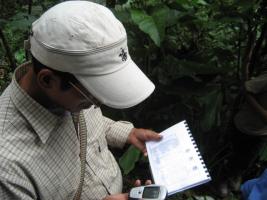SHG MIS: Management and Information System for SHGs

SHG MIS is a complete and modular Management and Information System (MIS) for village-based savings and lending groups, otherwise known as Self-Help Groups (SHGs). The project provides a complete end-to-end system for managing SHG information management and processing needs. It includes the design of accessible CAM paper forms for data entry in the field, a CAM-based mobile application for data entry from the field, a SMS gateway for processing incoming transaction data and a web-based software package for management of data and reporting at the branch or head office. It also includes a training and financial literacy component for empowering SHG members to become more effective financial managers. For more information, see this video.
ekgaon is currently pilot-testing the software along with the the Mahakalasm (literally, great vessel, i.e. for communal savings) SHG Federation in Natham, Tamil Nadu, promoted by the Covenant Centre for Development (CCD). Future implementations are planned in Andhra Pradesh, Gujarat and Madhya Pradesh. This project has been supported by SEEP Network's Practitioner Learning Program, IDRC's PanAsia program, and Microsoft Research's Digital Inclusion program.
RANDI: Representation AND Inspection Tool for Producer Cooperatives

RANDI is a mobile CAM-based inspection tool that allows farm inspectors to gather multimedia data based on a multiple-choice formatted questionnaire, automatically creating media-enhanced inspection reports. The goal of this tool is to aid in the quality control and certification process of small rural cooperatives, and to make use of this data to provide a rich and unique Internet presence. Using this system, small cooperatives can better monitor their members' compliance with organic (and other) production standards, maintain quality in their crop, and establish direct linkages with consumers.
Researchers from the University of Washington Computer Science and Engineering department are currently developing and testing RANDI along with Asobagri, a rural coffee cooperative located in the mountains of Barillas, Guatemala. This work has been supported by the ORIGINS project of Ricoh Innovations and Transfair USA.
DPS: Delivery Processing System for Producer Cooperatives

Providing localized and/or mobile pick-up and storage locations where producers can sell their goods near their farms significantly reduces their transaction costs. Many rural cooperatives provide this service. These transactions are currently recorded and communicated manually using paper documents and a telephone. Proprietary solutions consisting of handheld devices with barcode and/or RFID readers are found at loading docks around the world. DPS provides an equivalent solution using an open source software platform (CAM) and commodity hardware (mobile phones). Using DPS, remote supply chain transactions can be captured and transmitted more efficiently. This allows the cooperative to track specific deliveries (for product differentiation and meeting international traceability regulations), monitor remote inventory levels, respond to customer requests and document the price that was paid to the producer (for Fair Trade certification, and for collecting real-time transaction data).
Researchers from the University of Washington Computer Science and Engineering department are currently developing and testing DPS along with Asobagri. This work has also been supported by the ORIGINS project.
More CAM applications coming soon...
- Gather performance data of decentralized energy systems
- Post-disaster relief coordination
- Reporting civil abuse
- Secure financial transaction processing
- Local currency systems
- Tracking disease outbreaks
- Accessing electronic medical records